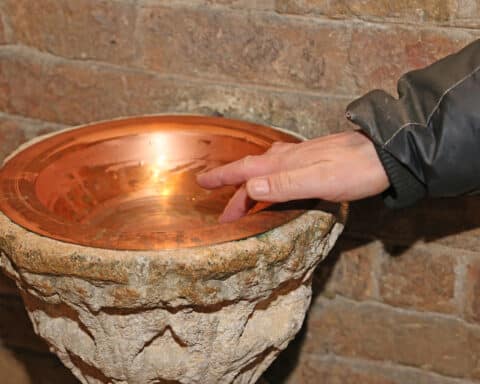I’m sure we’ve all heard the phrase “You can’t pour from an empty cup.” And with the trying times Catholics are facing, it can be easy to feel empty.
Phrases such as this are used to encourage self-care. Oftentimes we need to replenish ourselves so that we can continue to care for others. However, what is troubling about these encouragements is how they all point to “pampering” ourselves and looking to material things or internally for this care. Sometimes it can even go as far as shutting others out in the name of taking care of ourselves and putting ourselves first.

As disciples of Christ, we need to revolutionize the way we do self-care. Jesus tells us to love our neighbors as he has loved us. Instead of looking to ourselves and material things, it’s time that we turn the attention back to God and draw our strength from him and Christ’s exemplary service to others.
One premise of society’s approach to self-care is that we are here to please ourselves. This mentality tells us we must do whatever it takes to make ourselves happy, because that is the purpose of life and so that is what will bring us true fulfillment. Unfortunately, this view completely disregards God and what he created us for.
In her diary, St. Faustina records that Jesus once told her, “You are not living for yourself, but for souls…” (entry 67), and that goes for all of us. We were created and put on this earth to love God and others, meaning that we are charged to help others get to heaven. We are called to do this through service and sacrifice, often putting the needs of others before our own.
This can be taxing, but in times like these, when it feels like we have had enough and can’t do it anymore, we are supposed to turn to Jesus and look how he served others during his earthly ministry. He had a human nature just like ours, and thus he experienced fear just like we do, and possibly even the feeling of burnout like we do. Did he not say “Father, if you are willing, take this cup away from me…” (Lk 22:42) in the Garden of Gethsemane before his Passion? And yet, he finished with “…not my will, but yours be done.” He loved his Father and us so much that he was willing to overcome his own human feelings in order to serve us and show his love.
This is what we are called to do. Jesus wants us to look to him as our model of service and to fulfill the will of the Father rather than our own. We must look beyond our own wills and strength in order to fulfill our purpose.
People also fall into using material things to provide comfort and escape. I admit that at times I am one of them, and it is particularly easy to do in today’s world because of the advent of social media. Facebook, Twitter, Instagram and other apps are ways to try to get away from your problems and spend a few mindless hours doing things like posting pictures and taking meaningless quizzes.
While this can be fun and certainly entertaining, it draws us deeper into the ways and trivialities of the world and further away from God. We can also get sucked into the drama of an argument or gossip while on the Internet, and pretty soon we feel drained by participating in the activities that were supposed to help us get away from what was draining us.
And especially now, after hearing about all that is going on in the Church with the sexual abuse scandals and with all the rancor and discord in our government and political discourse, it can be very disheartening. We feel discouraged and again look for something to lift us up and make us feel satisfied.
This is God’s way of pulling us away from the things of the world and back to him, reminding us why we were created and what we should be focusing on.
So, what about that phrase “You can’t pour from an empty cup”? It is certainly true, but again, the emphasis seems to be on ourselves instead of God. We look to be able to fill this cup on our own when really only Christ can fill it.
If we go to him in prayer, he will give us the strength and graces necessary to be able to carry out his will and serve him through serving others. If we ask him for the strength to be able to pour from his own cup of suffering and self-sacrifice, he will certainly answer us and assist in our tasks. In this way, we will be able to do authentic self-care, taking care of our souls in doing what we were created for.





